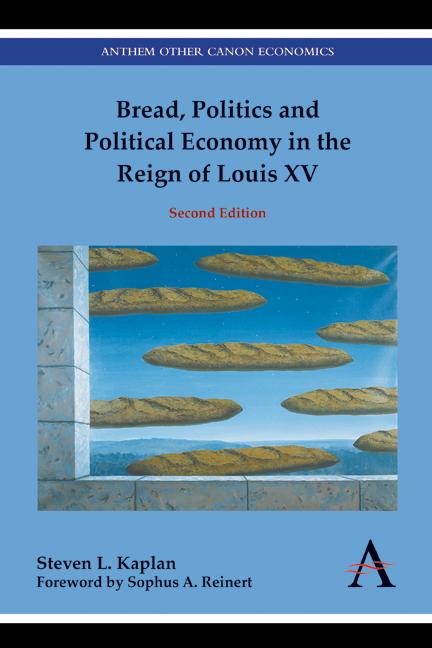Book contents
- Frontmatter
- Contents
- List of Illustrations
- Foreword to the Second Edition
- Acknowledgements
- List of Abbreviations
- Introduction
- Chapter I The Police of Provisioning
- Chapter II The Regulations and the Regulators
- Chapter III The Origins of Liberty
- Chapter IV The Response to Liberalization: Theory and Practice
- Chapter V Forcing Grain to Be Free: The Government Holds the Line
- Chapter VI The Reforms and the Grain Trade
- Chapter VII Paris
- Chapter VIII The Royal Trump
- Chapter IX The Government, the Parlements, and the Battle over Liberty: I
- Chapter X The Government, the Parlements, and the Battle over Liberty: II
- Chapter XI From Political Economy to Police: The Return to Apprehensive Paternalism
- Chapter XII Policing the General Subsistence, 1771–1774
- Chapter XIII The King's Grain and the Retreat from Liberalization
- Conclusion
- Bibliography
- Index
Conclusion
- Frontmatter
- Contents
- List of Illustrations
- Foreword to the Second Edition
- Acknowledgements
- List of Abbreviations
- Introduction
- Chapter I The Police of Provisioning
- Chapter II The Regulations and the Regulators
- Chapter III The Origins of Liberty
- Chapter IV The Response to Liberalization: Theory and Practice
- Chapter V Forcing Grain to Be Free: The Government Holds the Line
- Chapter VI The Reforms and the Grain Trade
- Chapter VII Paris
- Chapter VIII The Royal Trump
- Chapter IX The Government, the Parlements, and the Battle over Liberty: I
- Chapter X The Government, the Parlements, and the Battle over Liberty: II
- Chapter XI From Political Economy to Police: The Return to Apprehensive Paternalism
- Chapter XII Policing the General Subsistence, 1771–1774
- Chapter XIII The King's Grain and the Retreat from Liberalization
- Conclusion
- Bibliography
- Index
Summary
Like many parts of the Third World today, old-regime France was obsessed with subsistence—and for good reasons. Dependent for the most part on a single foodstuff whose production and distribution were hostage to a host of uncertainties, it is no wonder that the people of this society agonized over their material life. They had no sense of control over their environment—either the sociojuridical structure around which their lives were organized or the economic and physical circumstances in which they lived. Nor could the Enlightenment provide a dose of confidence and courage powerful enough to reach the bulk of the population. Not all the philosophical tracts on man's earthly potential, nor all the manuals on the application of vetch or the use of sainfoin, nor all the inoculations practiced on the children of princes could convince the “little people” of the eighteenth century that they lived in a world on the verge of mastering, or at least reaching an accord with, nature. Subsistence, of course, was not the whole story of man's predicament, but preoccupation with it was sufficiently universal and relentless to remind men every day of the precariousness of their situation and of their relative helplessness to change it.
Even as the marketplace, like the cemetery, was at the center of popular life in the Old Regime, so subsistence was always at the center of public concern. In the crudest terms, it can be said that fear of the people commanded attention to the people's fears. Subsistence uncertainty and anxiety impelled government to give the highest priority to provisioning. But government intervened in the first instance not so much to reassure the people as to reassure itself. From top to bottom, officials believed that the social and political structures could not passively bear the strain or tolerate the risks of scarcity. Subsistence was the precondition to social order. Their assumptions about the psychology of human motivation, the nature of commerce, and the habits of cultivators and suppliers convinced authorities that grain distribution could not safely be left entirely to private initiative and the arbitration of free market forces.
What nourished this ideology of fear and mistrust, what made the governors, like the governed, timid and conservative, what made intervention necessary and inevitable, was above all the nature of preindustrial society itself.
- Type
- Chapter
- Information
- Bread, Politics and Political Economy in the Reign of Louis XV , pp. 677 - 702Publisher: Anthem PressPrint publication year: 2015



